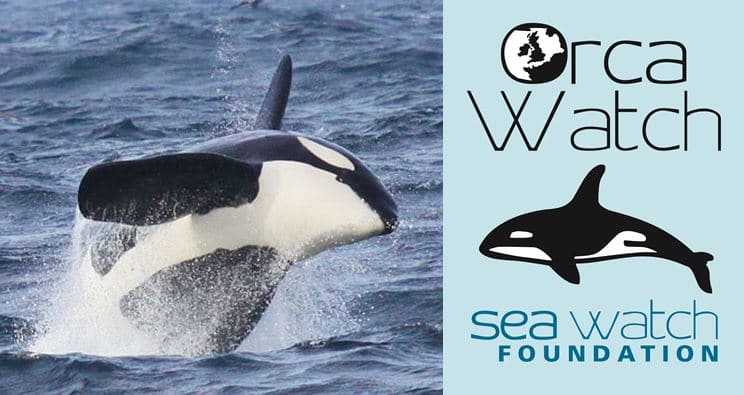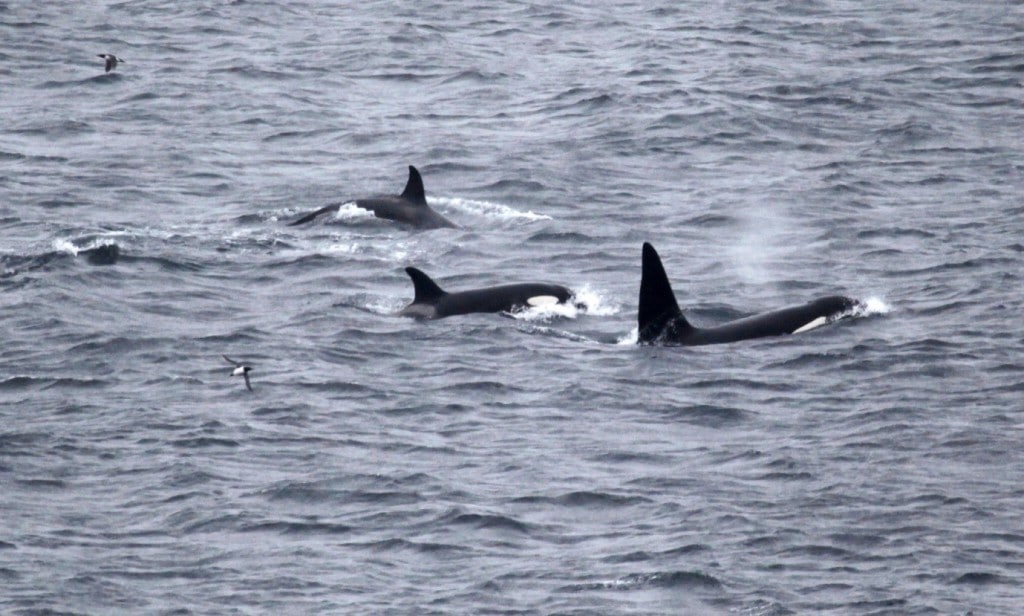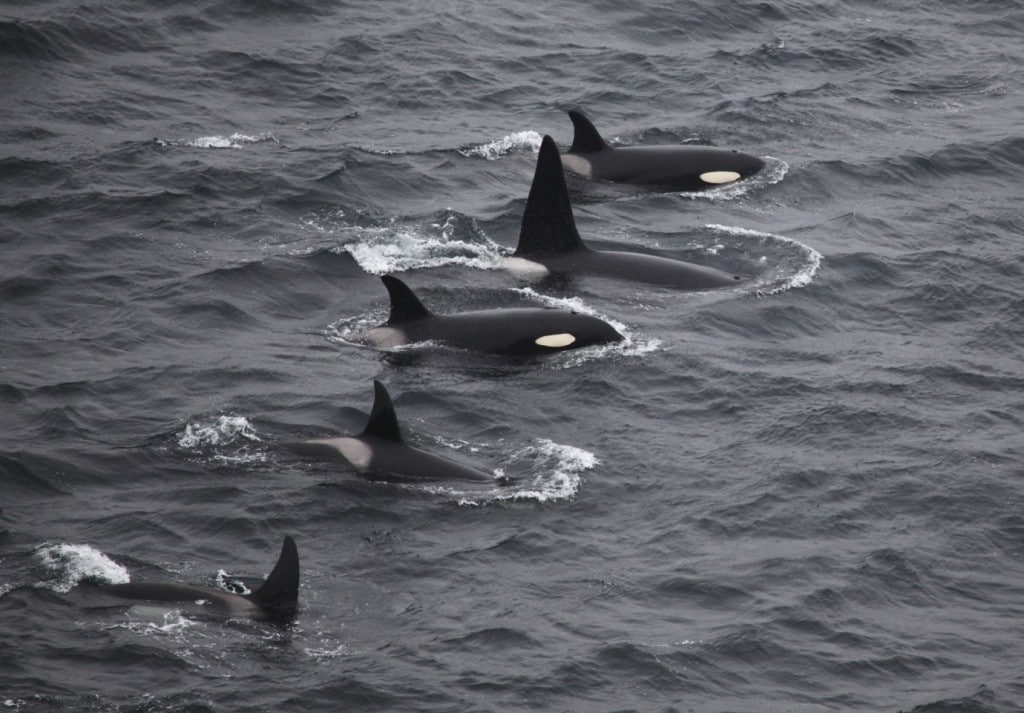Marine Life & Conservation
Your invitation to take part in the UK Orca Watch event 2018

Stunning close-up images and video footage of killer whales have recently been reported on social media. Observers in Scotland and Shetland have been witnessing orcas travelling very close to the shore, and lucky ferry passengers were amazed to spot them frolicking in the waters in the River Clyde. The scientists at Sea Watch Foundation are very pleased to realize how positively the general public responds to these encounters and how much they enjoy getting involved in reporting sightings of whales, dolphins and porpoises around the UK.
The time and dedication our volunteer sea watchers have spent searching for these species and the subsequent reporting of sightings have allowed the Sea Watch Foundation to improve the knowledge and understanding about the population status of local cetacean species around the British Isles. The Sea Watch Foundation is very proud of the time, energy and effort, that has gone into reporting public sightings which are the backbone of their national database which spans over four decades.
At the end of May, the Pentland Firth welcomes back the charity’s annual Orca Watch event during which the North coast is visited by hundreds of whale enthusiasts, tourists and local media wanting to witness the passage of killer whales close to shore.
Now in its 7th year this event originated from the collaboration between Sea Watch Foundation and their Regional Coordinator Colin Bird. With the possibility of underwater turbines installed in the area, a decision was made to establish a seasonal watch to gather information on how killer whales use this area and what might be the consequences of such an installation.

The 2018 event takes place from May 26th to June 2nd where people from all walks of life are invited to join the dedicated volunteers for watches throughout this time. There will be observers stationed at Duncansby Head, the main view point, but people will also conduct watches in Orkney and Shetland (times and locations can be found online at www.seawatchfoundation.org.uk/orca-watch-2018.
There will also be observers onboard the John O’Groats ferry connecting mainland to Orkney. This is an open event and anyone interested is welcome to reach the organized land watches at any time during the day, but people are also free to look out for whales and collate sightings anywhere else along the coast, and of course if they see anything, Sea Watch would love to hear about it! Sightings should be reported here www.seawatchfoundation.org.uk/sightingsform.
“We are so lucky in Caithness to be able to sight different cetacean species so close to shore!” says Anna Jemmett, Sea Watch regional coordinator and lead volunteer and organiser of this year’s event.
“For me, Orca Watch Week is about involving people and allowing them to experience something they never though they could be part of, it is about collecting vital data for the protection and conservation of orcas and other local cetacean species, and it is about sharing this magical event with people from all other the country and have fun all together!” continues Anna.

Killer whales photographed from the land during Orca Watch. Photo by Colin Bird / Sea Watch Foundation
The north coast of Scotland is one of the best places to see whales, dolphins, porpoise and many different seabird species in the UK. As well as the orca, many other species of whale and dolphin can be seen from the shore including the common minke and humpback whale, Risso’s, common and white-beaked dolphins and the harbour porpoise. For the bird aficionados, sightings of razorbills, puffins, fulmars, great skuas, and terns are possible too. If you live locally and want to organize your own land or boat watches the recording forms can be found online – www.seawatchfoundation.org.uk/recording-and-submitting-sightings and please get in touch with Sea Watch if you have any questions about it.
Sea Watch Foundation is also very proud to announce an evening of whale talks on May 26th at 7pm, at the Pultney Peoples Centre in Wick during the Orca watch. The guest speaker for the evening is Marie Mrusczok from Orca Guardians, an independent conservation non-profit dedicated to the protection of orcas in Iceland, who is going to provide valuable insight into the seasonal movements of orcas between Iceland and Scotland.

Killer whales photographed from the land during Orca Watch. Photo by Colin Bird / Sea Watch Foundation
Full details of all Orca Watch events can be found here:
- www.seawatchfoundation.org.uk/orca-watch-2018
- www.facebook.com/seawatchfoundation
- Twitter: @SeaWatchersUK #SWFOrcaWatch
Marine Life & Conservation
Leading UK-based shark conservation charity, the Shark Trust, is delighted to announce tour operator Diverse Travel as a Corporate Patron

 Corporate Patrons provide a valuable boost to the work of The Shark Trust. The Trust team works globally to safeguard the future of sharks, and their close cousins, the skates and rays, engaging with a global network of scientists, policymakers, conservation professionals, businesses and supporters to further shark conservation.
Corporate Patrons provide a valuable boost to the work of The Shark Trust. The Trust team works globally to safeguard the future of sharks, and their close cousins, the skates and rays, engaging with a global network of scientists, policymakers, conservation professionals, businesses and supporters to further shark conservation.
Specialist tour operator Diverse Travel has operated since 2014 and is committed to offering its guests high quality, sustainable scuba diving holidays worldwide. Working together with the Shark Trust will enable both organisations to widen engagement and encourage divers and snorkellers to actively get involved in shark conservation.
“Sharks are truly at the heart of every diver and at Diverse Travel, we absolutely share that passion. There is nothing like seeing a shark in the wild – it’s a moment that stays with you forever!” says Holly Bredin, Sales & Marketing Manager, Diverse Travel.
“We’re delighted to celebrate our 10th year of business by becoming a Corporate Patron of the Shark Trust. This is an exciting partnership for Diverse and our guests. We will be donating on behalf of every person who books a holiday with us to contribute towards their vital shark conservation initiatives around the world. We will also be working together with the Trust to inspire divers, snorkellers and other travellers to take an active role – at home and abroad – in citizen science projects and other activities.”
Paul Cox, CEO of The Shark Trust, said:
“It’s an exciting partnership and we’re thrilled to be working with Diverse Travel to enable more divers and travellers to get involved with sharks and shark conservation. Sharks face considerable conservation challenges but, through collaboration and collective action, we can secure a brighter future for sharks and their ocean home. This new partnership takes us one more valuable step towards that goal.”
For more information about the Shark Trust visit their website here.
For more about Diverse Travel click here.
Marine Life & Conservation
Shark Trust Asks Divers to help with Shark Sightings this Global Citizen Science Month

 Whether you are stuck for ideas of what to do with the kids or are off on the dive trip of your dreams. You can get involved in Citizen Science Month and help the Shark Trust by providing vital data about sharks are rays both close to home and further afield.
Whether you are stuck for ideas of what to do with the kids or are off on the dive trip of your dreams. You can get involved in Citizen Science Month and help the Shark Trust by providing vital data about sharks are rays both close to home and further afield.
In addition to reporting the sharks and rays you see on your dives, the eggcases you find on the beach, the Shark Trust is looking for some specific data from divers who are asked to report any Oceanic Whitetip and Basking Sharks.
Oceanic Whitetip Sharks
The Shark Trust are looking specifically for Oceanic Whitetip Shark sightings over the coming weeks and months. So, if you are diving anywhere in the world, please report your sightings via the website or app.
Website: https://recording.sharktrust.org/
App: Search The Shark Trust in your app store
The Oceanic Whitetip. Known for their incredibly long dorsal and pectoral fins, this species was once the most abundant oceanic-pelagic species of shark on the planet.
Large and stocky, they are grey or brown above, and white below and famous for their huge rounded first dorsal fin and paddle-like pectoral fins. The fins also highly prized within the shark fin trade. Whilst they are mostly solitary, Oceanic Whitetips do occasionally hunt in groups.
An inquisitive species, they were easy prey for fisheries. Combined with their low reproductive rate, they were inevitably at high risk of population depletion. And declines of up to 99% have been reported in certain sea areas. They are listed as Critically Endangered on the IUCN Redlist (2019).
Conservation efforts to discourage further declines include listing on CITES Appendix II and CMS Appendix I. They’re also the only species prohibited from take by all the Tuna RFMOs (Regional Fisheries Management Organisations). However, these measures do not mean that Oceanic Whitetips are not still caught – whether targeted or as bycatch – in some parts of the world. With populations declining at such a high rate, effective implementation of management measures is essential to ensure that the species can recover.
If you are lucky enough to get an image of an Oceanic Whitetip and you record your sighting on the Shark Trust app or website YOU CAN WIN! All images submitted with sightings, that also give consent to use in conservation messaging, will be in with a chance to win an Oceanic Whitetip T-shirt and mug. The competition will run until the end of “Shark Month” in July – so keep those sightings (and images) coming in.
Basking Sharks
Basking Shark (Cetorhinus maximus) season is upon us, and the Shark Trust is asking everyone to keep an eye out for these majestic giants over the summer months. If you see any, you can record your sighting to the Basking Shark Sightings database.
Each year, these mighty fish return to British waters to feed on plankton. You may see one, (or a few if you’re really lucky) from around April-October. They can be seen feeding at the surface of the water, where they look like they’re basking in the sun. Thus, their name!
Sighting hotspots around the British Isles include southwest England, Isle of Man, north coast of Ireland, and western Scotland. The Sea of the Hebrides is the most prolific sightings area in Scotland, but they have been spotted all around the coast and have even ventured into some of the sea lochs. The Shark Trust has received thousands of sightings since the Basking Shark project began, but more data is needed to truly understand what is going on with population numbers and distribution. You can help by recording your sightings this summer.
Great Eggcase Hunt
The Shark Trust has an Easter Egg Hunt with a difference for you to try. Take part in the Great Eggcase Hunt and get involved with a big citizen science project that helps shark, ray and skate conservation. And it’s an enjoyable activity for all the family.
The Shark Trust also want snorkellers and divers to record their underwater eggcase findings. Underwater records help pinpoint exactly where sharks and skates are laying their eggs and can help link to beach records. Learning the depth and substrate that they lay on also helps better understand the species.
Find out more: https://www.sharktrust.org/great-eggcase-hunt
Whether you are diving, snorkelling or exploring on the beach you can take part in Citizen Science Month and get actively involved in shark and ray conservation. Find out more: www.sharktrust.org
-

 News3 months ago
News3 months agoHone your underwater photography skills with Alphamarine Photography at Red Sea Diving Safari in March
-

 News2 months ago
News2 months agoCapturing Critters in Lembeh Underwater Photography Workshop 2024: Event Roundup
-

 Marine Life & Conservation Blogs2 months ago
Marine Life & Conservation Blogs2 months agoCreature Feature: Swell Sharks
-

 Blogs2 months ago
Blogs2 months agoMurex Resorts: Passport to Paradise!
-

 Blogs2 months ago
Blogs2 months agoDiver Discovering Whale Skeletons Beneath Ice Judged World’s Best Underwater Photograph
-

 Gear News3 months ago
Gear News3 months agoBare X-Mission Drysuit: Ideal for Both Technical and Recreational Divers
-

 Gear Reviews2 months ago
Gear Reviews2 months agoGear Review: Oceanic+ Dive Housing for iPhone
-

 Marine Life & Conservation2 months ago
Marine Life & Conservation2 months agoSave the Manatee Club launches brand new webcams at Silver Springs State Park, Florida









